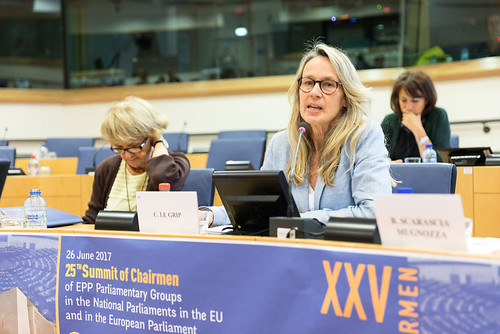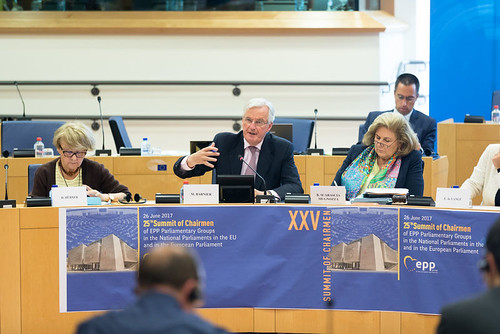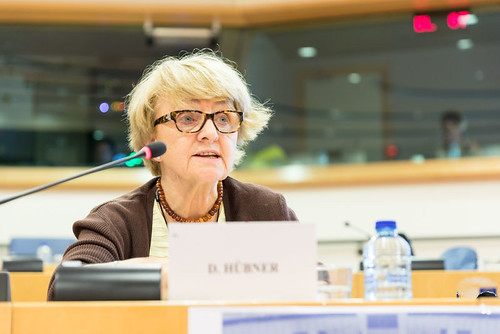Thank you very much for your kind invitation.
I know that many of you here in this room have come for the first time to this part of
the world. I wish you a good stay in Warsaw and hope you will take home good
memories of our discussions.
I would like to say a few words on what we, Central Europeans have to do to be fit
for the XXI century, for these years of collaborative competition. But it is impossible
to look at us, Central Europeans without broader European perspective. And let me
underline right from the beginning that it might be difficult, if at all possible, to be fit
without European unity and solidarity.
Allow me to dedicate one minute to history. When the Second World War ended, the
Western part of Europe has embarked on the process of integrating the continent.
Due to the East-West political division of the continent, a large part of it remained on
the other bank of the river. But the fathers of European integration – unfortunately it
seems like European integration has no mothers – were sufficiently visionary and the
door stayed ajar. In 2004, first group of eight economies in transition to democracy
and market economy joined the European Union. Since then we have been working
against this traditional East – West division of the continent.
Today among 28 Member States of the EU, 11 are former centrally planned
economies and among 19 Members of the Eurozone there are 5 of them. Since
2004, the catching up process has been remarkable. It is worth mentioning that back
in 2004 the GDP / per capita in Poland was at the level of 44% of the then EU
average, today it is close to 70%.
But the Central European region continues to be very much diverse, with some
similarities, but also with significant divergences, both in terms of what has been
already achieved and in terms of untapped potential.
Also, there are many political, social and economic challenges countries of this
region face. One of them is the middle-income trap.
Global history gives us example of economies stagnating at middle-income levels
and failing to graduate into the ranks of high-income countries. Economies often get
stuck in between as they do not have access to the best technologies (reserved to
rich economies) and over time also loose the advantage of lower wages (reserved to
the poorest ones). Middle income trap is not only about economy. This failure tends
to have serious social and political consequences.
The worry now is that these countries slowly exhaust the benefits derived from
traditional growth drivers. That should force us to make the leap onto new innovation
frontiers. We must be ready for this leap, exploring also the potential of EU
membership that facilitates building innovation capacity and provides resources. The
worry of the trap materializing is also accentuated by an ageing population. Human
capital is the most valuable asset of these economies. Women, well-educated and
talented form a good half of this capital. But we also have to open more generously
to immigration. In this context a reset in our thinking is needed.
We are also surrounded by a global change. It is fast and disruptive, but it also
provides economic opportunities to Central Europeans. In the next decade, these
opportunities will lie in digital economy, technological disruption, in serious and
unqualified commitment to industry 4.0 which is essentially about data and their
flows, in investing in services as this will continue to be the highest value added part
of the value of a product.
It cannot be underlined enough that independently of being an undisputed success
story for the last decade, our region has to go well beyond “catch-up” dynamics,
depending mostly on lower wage costs. This approach must be abandoned. We
have to move away from efficiency based to innovation based growth model.
In order to succeed in a new, more competitive environment defined by digitalization,
technological advances and increased mobility our countries have to move swiftly to
reorienting the economies toward innovation-driven model of sustainable growth.
This would require a powerful collective effort by both the private and public sectors,
based on trust. And we all know that across the world we suffer from the trust deficit.
Let me also underline that this reorientation toward a sustainable, innovation-driven
and entrepreneurship-based added-value economy needs a sense of urgency.
Closer cooperation and deeper integration within the framework of the European
Union, which proves to be the best vehicle for success for this region is also
needed.
Central Europeans who are not yet part of the common currency area, and these are
three of the eight countries that joined the EU in 2004: Poland, Czech Republic and
Hungary, should make efforts to complete the region’s accession to the euro zone.
This would strengthen the regional ties and facilitate the regional market
consolidation.
The euro zone goes through major reforms of its architecture and governance, doing
much more than just fine tuning its mechanisms and procedures. For the late
comers, if they delay the accession, the gap to catch up with the new governance of
eurozone will continue to grow. Staying outside means be guided by changes
decided by others and adapting to them. In the meantime the countries not yet
members of the common currency are welcomed to join all the mechanisms open to
non members e.g. Banking Union. This could help to retain influence and secure
their interests.
Reform of the euro zone has started to generate new geometry in Europe. Results of
the British referendum can add to it. This perspective of differentiated integration
deserves reflexion by those not yet qualifying to the future “core” Europe.
Central Europe has all the assets to be active in restoring conditions for the so badly
needed growth in the European Union.
It can also actively contribute to the Union’s place and role in the global world. We
should lead the calls to look for European solutions to such challenges we face as
security and migration.
There is no reason for our countries not to be active in leading EU efforts in
completing EU single market in energy, services and digitalization. Competitiveness
efforts should go hand in hand with global engagement, including TTIP. Here, these
countries are among those who would benefit most from the new trade and
investment agreement between EU and US, from technology and know-how
transfers, increased capital flows and opening products and services markets. It is of
particular relevance for small and medium size companies and consumers.
Central Europe governments but also businesses should act to foster intra-regional
connections, generating more region wide benefits. This is true for energy and
transport but there are also available synergies in the area of innovation strategies or
cooperation between academic communities.
All of our countries face the need of investing smartly in education. It is not about
adding – to already over educated human resources – new university graduates.
What we need here is skills matching the labour market needs.
We still have rather small and fragmented capital market, hardly contributing to
investment funding. Full and smart use of European structural funds continues to be
a strong pro-growth factor which has to be fully exploited.
To sum up, on economic side our trade mark should be a dynamic pursuit of a
modern competitiveness 4.0 agenda.
But we, the Central Europeans have also great interest in revamping the Common
Foreign and Security Policy of the European Union. External challenges we face
include resurgent Russia and terrorism. There are wars and conflicts in our
neighbourhood.
Central Europe should be loud and clear in calling for efforts to strengthen Europe
and spare no efforts to work in this direction. We have no interest in seeing Europe’s
unity weakened in the time when unity and solidarity matter most. We should be
strong and united in our fight against populism and radicalisation of politics.
Let me say a few words on women’s role in this change.
The expansion and recognition of entrepreneurship as one of the engines of
transitional economies were among the major changes brought about by the
transition from the planned economy to the liberalized market economy in the 1990s.
In the rapidly changing social and economic environment of the transition countries,
entrepreneurship held the potential to contribute to both economic development and
social inclusion. It opened the new possibilities for women in terms of personal
advancement and income generation for household needs. On entrepreneurship we
largely succeeded.
Have our governments and parliaments helped us in this?
Governments and parliaments today are certainly expected to provide gender
inclusive law. They are to ensure that we have an inclusive society. They are to
facilitate development of inclusive enterprises. And last but not least they are here
and now to run inclusive policies. On neither of these four fundamentals the
contemporary democracies of Central Europe have delivered. It is particularly visible
in the context of the labour market.
If the entry barriers were less impermeable and a critical mass of women would
invade governments and parliaments, we would have more collaborative models of
governance.
In our region, achieving critical mass of women in those public decision making
bodies is a remote objective. Today we see far too often a complete absence of
women in those institutions. No wonder therefore that in governments there is no
understanding of gender specific impact of policies and policy tools. Even if we put
aside the ideology, we will still see lack of institutional capacity to address such
impacts.
In the years to come most of new jobs will be created in digital economy. It is an
example of a labour market segment where an important gender skill gap can grow.
Girls do not go to technical universities. There are many reasons for that.
Girls’ families do not encourage them to do it, peers do not encourage them,
universities do not reach out to girls. Once again we will put women at disadvantage
on the labour market by adding a new mismatch. But the loss is for entire society,
not only for women.
The cost for society comes from the fact that technologies of today and tomorrow are
not about technology as such. New high technologies, and ICT in particular, to bring
full benefits to our societies require understanding of the fast changing society, its
changing needs, of new patterns of relations, of changing consumers’ culture. The
economy ahead of us will be more contracted in industries 4.0 that require a
combination of hard skills with social skills.
This change is tailored for women. This is the environment where women thrive.
We are living era of a massive behavioural change, taking us toward a more
collaborative society and sharing economy. But also more competitive when it comes
to results. We are going to live in a collaborative- competitive tension. This change is
far too slow in our part of Europe.
But what is also needed is an overhaul of thinking about what is a cost in our socioeconomic
practices and what is an asset or social investment. Gender stereotypes are a cost. Here, in Poland, we, women go beyond fighting stereotypes. We have a
positive, constructive agenda. And it is much more than a feminist agenda, it is an
agenda for a society that embraces new challenges with full use of its most precious
assets. What we need is to make ourselves a more visible driver of this change.
We must work on getting more women into politics because our agenda is a new
leadership agenda. Women go for politics of fairness and equality, for collaborative
models of leadership, they detest dogmatism, look for smarter and leaner solutions,
feel good out of the box, and definitely are better prepared when making the first
step.
Small and medium enterprises, which still are the preferred mode of employment for
most women, are systematically losing their exclusively local character and
increasingly have to be present and competitive in the global market. That requires
development of different skills, as well as expectations and different model of goalsetting
by women who see their future in business. They have to prepare themselves
for winning in a much larger field of opportunities, but at the same time they have to
build a stronger presence in networks that facilitate the economic success.
The economy based on fast reading of needs of various groups of customers, on the
open source access and sharing model brings entrepreneurship to a new level,
generating growth faster and making it more evenly distributed across all the sectors
of the economy, also those on the cutting edge of technological advances.
The new “economic ecosystem” that is in the process of creation will be clustered
around start-ups in leading technologies: big data, design, medical research,
biotechnology, optics, internet of things, architecture of internet, but also those
around the social dimension of economy: social media, creating co-working spaces
in real or virtual reality, gamification, crowdsourcing of ideas and means for change.
And here women can tap into this changing environment. They will of course need
the support of the already existing professional women networks, but also the
commitment of the states and employers to ease up their career ladder and
advancement opportunities. They would also need a less stressful access to capital
and funding sources if they wanted to create something on their own account.
And there is one more challenge on which we have to work together and where
women can become leaders. This is the need of finding a better balance between
interests and values.
Let me conclude by saying that the space that is opening for innovative participation
in shaping global market by women with talent, dedication and commitment to
success is practically infinite. I am convinced we will fully use this opportunity.
Przemówienie prof. Danuty Hübner o globalnych i regionalnych megatrendach wygłoszone podczas Światowego Szczytu Kobiet, 10 czerwca 2016 r.







 Przejdź do kalendarza
Przejdź do kalendarza






